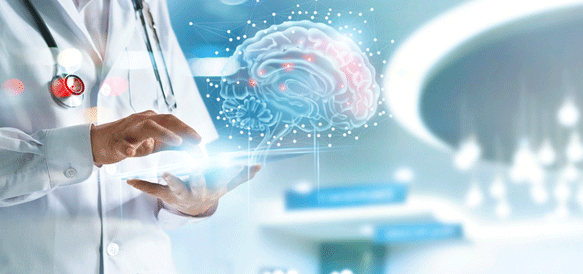
In today’s technological landscape, artificial intelligence significantly influences various sectors, well beyond the areas traditionally associated with this technology. This article highlights the magnitude of the impact of AI on unexpected sectors, exploring how this technological revolution transcends conventional boundaries and brings innovative benefits where it was not expected.
Health and medicine
The integration of AI in the field of health fundamentally revolutionizes the way medical diagnoses are made. Machine learning algorithms, powered by huge sets of medical data, can analyze and interpret complex information with remarkable accuracy. This capability enables faster and more accurate diagnoses, improving patient management. AI also contributes to the early detection of certain diseases, thus increasing the chances of successful treatments.
An exciting area of AI application in the healthcare sector is the search for personalized treatments. By using massive genetic, medical and clinical data, AI can identify complex patterns and subtle correlations that are often beyond human observation. This unique ability paves the way for the design of tailor-made therapies, adapted to the individual characteristics of each patient. As a result, AI offers an innovative approach to optimizing medical treatments, increasing the effectiveness of therapeutic interventions and personalizing care in an unprecedented way.
Smart agriculture
Integrating AI into agriculture offers innovative solutions for crop management and yield forecasting. AI technologies enable the analysis of complex data such as weather, soil type, and crop history. By combining this information, farmers can make informed decisions about the optimal time for planting, irrigation and harvesting. This predictive approach helps maximize yields while minimizing losses, creating more sustainable and efficient agriculture.
AI brings a revolution in agricultural efficiency by introducing smart technologies. For example, drones equipped with AI technologies can monitor crop conditions, detect diseases or pests, and recommend targeted interventions. These advances are transforming traditional agriculture into a smart and connected system, improving not only productivity, but also the environmental sustainability of the agricultural industry.

Tourism and travel
The impact of AI in the tourism sector goes beyond simple automation. By leveraging the vast datasets available, travel companies can use AI to provide personalized recommendations to travellers. Sophisticated algorithms analyze past preferences, market trends, and even weather conditions to suggest destinations, activities, and itineraries that match individual traveller expectations. This increased customization transforms the tourism experience into a tailor-made adventure.
In addition, AI-based virtual agents are becoming indispensable companions for travelers. Whether booking flights, searching for accommodation, or planning activities, these virtual assistants can provide real-time information and personalized advice. With natural language processing capabilities, these agents are able to understand and respond to user requests, providing continuous assistance throughout the journey. AI thus becomes a trusted partner to make the travel experience more fluid and enjoyable.
Education reinvented
AI plays a transformative role in education by being integrated into education systems. Through advanced algorithms, educational institutions can analyze student performance, identify individual gaps and adapt teaching methods accordingly. This allows a personalized education, where each student can benefit from a program adapted to his level of understanding and his specific needs. Virtual tutors using AI can also provide ongoing support, answer student questions and guide their learning. Thus, AI redefines the way we approach education, offering tailor-made learning opportunities and maximizing the potential of each learner.
Art and creativity
AI opens new frontiers in the artistic field, offering innovative applications that transcend the boundaries of human creativity. Advanced algorithms can be used to generate unique works of art, explore new styles and push the boundaries of artistic expression. This collaboration between technology and human creativity leads to new and stimulating artistic experiences.
Indeed, artists experiment with AI systems to generate ideas, explore artistic concepts and even create collaborative works. This synergy between the human artistic vision and the computing power of AI opens up unique perspectives, redefining the way we perceive and create art.
Sport and performance
The integration of AI into sports is revolutionizing data analysis, offering in-depth insights into athlete performance and the game itself. AI technologies can process huge volumes of sports data, providing advanced analytics, trends and predictive models. This allows teams, coaches and athletes to make informed decisions based on in-depth information.
AI also plays an essential role in improving sports performance and preventing injuries. Using smart sensors, tracking devices and predictive analytics, athletes can optimize their training, monitor their fitness and minimize the risk of injury. This strategic use of AI helps maximize athletic potential, thus improving results and sustainability in the world of sport.

Environmental Management
AI has become a powerful tool in environmental management, offering innovative solutions for monitoring and preserving our planet. Sophisticated algorithms analyze environmental data in real time, enabling accurate monitoring of air, water and ecosystem quality.
Intelligent AI applications contribute significantly to sustainability and environmental protection. Innovative approaches such as the use of autonomous drones and connected sensors enable efficient data collection, facilitating early detection of environmental problems. By integrating AI into environmental management, we can implement more effective strategies to preserve our planet and meet contemporary environmental challenges.
In conclusion, AI has proven to be a powerful catalyst for transformation in unexpected sectors, redefining how we approach diverse areas such as health, agriculture, tourism, education, art, sport and environmental management. These examples demonstrate the adaptability and potential of AI to create innovative solutions. As we explore the frontiers of AI, it is fascinating to consider the future potential of this technology in unexplored fields. Continuous developments in the field of AI promise to surprise us even more and bring unexpected benefits to our world. It is up to us to embrace these opportunities with wisdom and responsibility to shape a future where AI significantly improves our daily lives.
Ready to boost your productivity with Leexi?
Leexi AI Notetaker takes notes for you